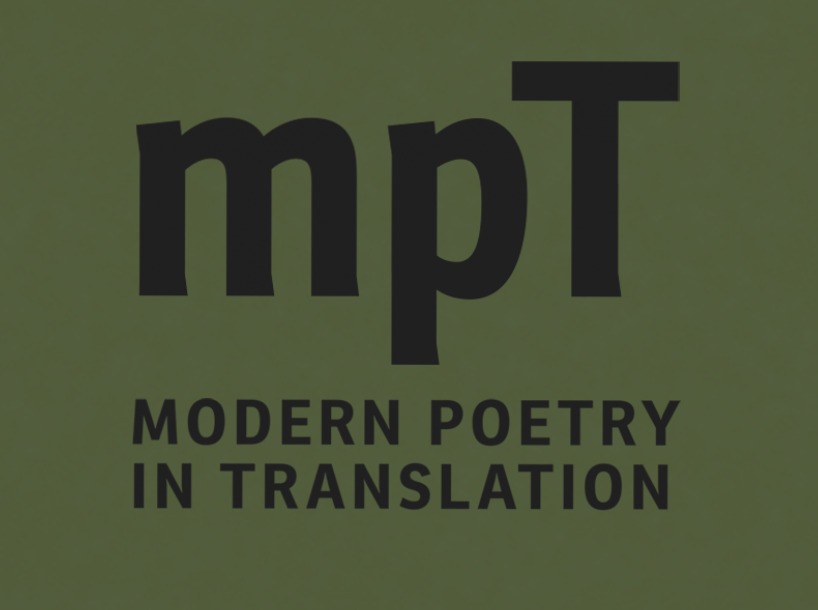In this blog for The Queen’s Translation Exchange, Dr Aleksandra Majak (New College) writes about the story behind Modern Poetry in Translation magazine, its early policy of ‘literariness’, and its connections to Eastern Europe of the mid 1960s.
In 1962, a few friends who had known each other since their university days met up at a New Year’s Eve party. Over the course of the evening, they came up with an idea; a new kind of publication, aiming to shake up and revitalise the literary landscape: Modern Poetry in Translation. This journal, still published today, was the first such initiative in Britain to publish the poetry of contemporary and foreign authors exclusively. As one of the authors published in the first issue put it years later, German-Israeli poet Yehuda Amichai, the journal ‘expresses a certain cultural tendency, not just a magazine’ [1].
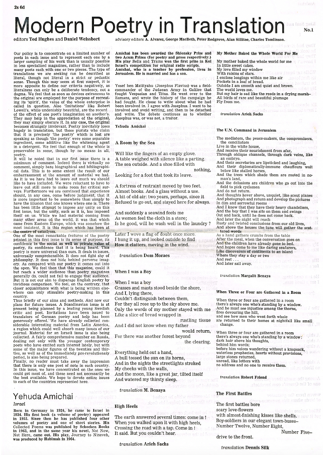
Front cover of the inaugural 1965 issue of MPT
The group present at the New Year’s Eve party that brought about the founding of the pioneering magazine included the poet Ted Hughes, translator and editor Daniel Weissbort, and the literary critic and impresario Al Alvarez. Their aspiration for the magazine was for it to become ‘an airport for incoming translations’ [2], sharing a conviction that, as we read in the first editorial to MPT, ‘what is being written elsewhere can only stimulate poetry-making in this country’ (MPT 1).
After months of gathering material, seeking financial assistance from the Arts Council of Great Britain, and connecting with fellow poets and translators, the first issue of MPT was launched in 1965 in a limited run of 500 copies. Designed by Richard Hollis and printed as a thin, semi pellucid broadsheet, the magazine more closely resembled a promotional flyer than a serious publication with the ambition to reinvigorate the domestic literary scene. Though the fragile format would soon be changed, the appearance of the first issue was purposeful and represented a deliberate and significant shift in the intended readership of such a publication. Hughes hoped to make the magazine ‘functional, current, disposable’ [3], ultimately widening access to the poetry in translation.
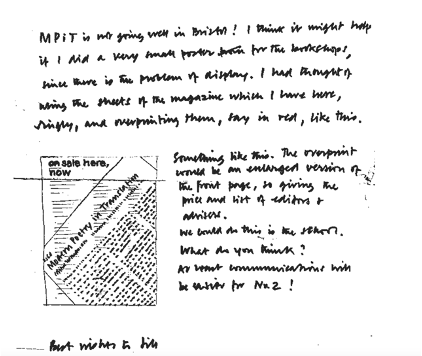
Letter from Richard Hollis to Daniel Weissbort
Courtesy of King’s College London Archives MPT 3/1/15
Even though the materials available in the magazine’s archives (located at King’s College London) contain ample evidence of the fact that Hughes and Weissbort had been toying with the idea of such a publication (taking inspiration in format of Belgian Journal des Poètes) for quite a while already, the energy which ultimately brought the project to life came from Alvarez. Not long before the fateful New Year’s Eve party, the critic returned from his travels around the Eastern Bloc where, as a correspondent for the BBC Radio Programme, he had been gathering material for a series of broadcasts (later published by Penguin in text form, with the title Under Pressure), each offering a spotlight on the distinct cultural scenes of the individual countries comprising Eastern Europe as well as the political pressures local artists felt themselves to be under.
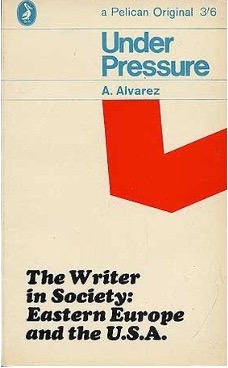
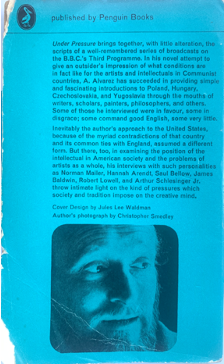
The front and back cover of Al Alvarez’s Under Pressure (1965)
It was during these travels that Alvarez encountered the poetry of Miroslav Holub of Czechoslovakia, Zbigniew Herbert of Poland, Vasko Popa of Serbia, and János Pilinszky of Hungary – all of which would ultimately be printed in the first few issues of MPT. The translations he brought back from the other side of the Iron Curtain proved inspirational for Hughes and Weissbort. The editors would later recall: ‘what finally overwhelmed us into publishing our first issue was the translated work of a group of poets who seemed to us revelatory’ [4]. In the first editorial for MPT, they asserted:
There has been little attempt to impose any unity on this first issue, but the unity, such as it is, has imposed itself on us. While we had material coming from many other areas of the world, it was that which came from Eastern Europe, which was somehow the most insistent. (MPT 1)
This might seem like a strange comment – how, after all, could unity (subject of editorial choice and policy of inclusion) impose itself on the editors? One possible answer may come through thinking of translation as always bearing an imprint of the receiving culture, which as the translation studies theoretician Lawrence Venuti has shown, mirrors its values and expectations [5]. The influx of translations happily coincided with a growing general sentiment that British high modernism was coming to its natural end and the Island was, to allude to John Esty’s thought-provoking book, indeed ‘shrinking’ [6].
Therefore, the translation boom came about against the backdrop of many political and social changes, including critiques of the cultural malaise and creative inertia of 1960s Britain; the expansion of the literary market; and the inception of some of the first literary festivals — like 1967’s Poetry International — which made authors more ‘visible’ and changed the traditional expectation that authors be performers of their own work.

Broadside of the Poetry International 1967 Festival
It is no coincidence that, not long before the launch of MPT, Alvarez was engaged in compiling The New Poetry anthology which would later become both controversial and influential. ‘Anthologies of this kind’ – Alvarez explained in his autobiography – ‘they are statements of personal taste, literary criticism in disguise, and if not one is offended by them they have failed’ [7]. Its combative introduction turned again the poetic idiom of the Movement and urged British poetry to develop a ‘new kind of seriousness’ and go ‘beyond [the] gentility principle’ by firstly addressing the question of the barbarity of writing poetry after Auschwitz (as famously pronounced by Theodore Adorno), and secondly by turning its attention to rougher poetic idiom and the threat of global nuclear disaster [8].
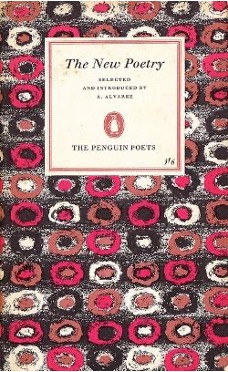
The cover of Alvarez’s anthology The New Poetry (1962, revised and expanded edition 1966)
What Hughes and Weissbort deemed ‘revelatory’ in their early encounters with translated poetry responded to precisely these demands of ‘going beyond’. Their comments keenly show how early encounters with foreign lyric was a catalyst not just for the foundation of MPT but for a wider and deeper reflection on the general condition of British poetry at large.
Poets from Eastern Europe were not just translated into the English language but translated with a whole range of extra-textual expectations. Editors were especially fascinated by what they described as the ‘direct’, ‘rough’, ‘unpolished’, and ‘literal’ style of the foreign poetry. This latter concept seems especially problematic today – the editorial to the Czech issue of MPT gives a hint of the basis of this unusual policy:
after our experience as editors of this paper, we feel more strongly than ever that the first ideal is literalness, insofar as the original is what we are curious about. The very oddity and struggling dumbness of a word-for-word version is what makes our own imagination jump. (MPT 3)
It remains uncertain what this ideal of ‘literalness’ actually represented to the editors, and this passage exhibits a sense of urgency that prompt the very act of translation. It does not stand for any recognised method of rendering poems from one language to another. Though the question of equivalence is as old as the history of translation, seeking ‘literalness’ was very much an idiosyncratic and time-specific idea. Years later, Weissbort admitted that Hughes might have taken the concept a bit too far, distorting the original works in favour of what he wished to see (and feel) in translation.
Even if we may now disagree with such a purposeful foreignization of incoming lyric, the pattern speaks to the needs and climate of the time. The editors of MPT continued to see the ‘extremity’ of the Eastern European experience as adding value and a means of authenticating the dramatism of poetry. In the mid-1960s, a period marked by the stark political divisions, poetry from the region must have felt vague and remote to the British audience; it is fascinating to think of the extent to which the poetry of Eastern Europe, viewed at the time as one homogenous entity with little distinction made between each nation’s own poetic tradition, satisfied local needs and filled gaps in ‘seriousness’, bringing much-desired ‘anti-gentility’ to the domestic literary market.
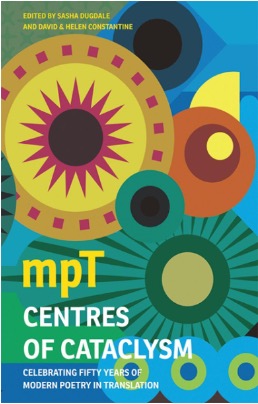
The cover of the Centres of Cataclysm anthology, ed. by Sasha Dugdale, David Constantine, and Helen Constantine (Hexham: Bloodaxe Books, 2016)
Entering the British literary scene through backstage doors, poetry from Eastern Europe had a significant (though surprisingly little-known) influence on the British translationscape of the mid-1960s. As MPT’s website states, the magazine’s origins should now be seen as rooted in the larger context of Cold War politics. In her editorial for Centres of Cataclysm (2016), an anthology published in celebration of fifty years of MPT, former editor Sasha Dugdale observed that the selection of Eastern European poets published in the first issue should now be seen merely as a ‘partial snapshot’ from the region that just happened to be in line with the editors’ interests and ‘favoured few European male voices, a new canon in place of the old’ [9].
For more theoretically-informed readers, it is interesting to contextualise the editors’ 1965 hope for stimulating the domestic literary scene in reference to concepts later developed by translation studies [10]. However, the 1965 launch of MPT occurred before the new academic field of translation studies fully emerged in the early 1970s and it is important to stress that the magazine was a collaborative effort of poets, translators, and most of all, friends — not of theoreticians and academics. On the one hand, dispatches from the early days of MPT evidence a shared urgency of ‘going beyond’ the domestic literary scene and exploring beyond the UK’s border. On the other, many early commentaries may be deemed to say more about the reality of mid-1960s Britain than of Eastern Europe, contributing to a ‘flattened’ image of the region in an otherwise fascinating and complex cultural transfer.
Since 1965, Modern Poetry in Translation has inspired international collaborations, contributed to the popularity of the first literary festivals, and engendered valuable collaborative and social bonds between influential individuals based primarily on the shared sentiment that translation makes something happen. And as such it, to bring us back to Amichai’s words, it represented and continues to stand for a broader cultural tendency, not just its own stated values.
Notes
[1] The Poetry of Survival: Post-War Poets of Central and Eastern Europe, ed. by Daniel Weissbort (London: Anvil Press Poetry, 1991), p. 305-312.
[2] Ted Hughes and Daniel Weissbort, Selected Translations (London: Faber and Faber, 2006), p. 204.
[3] See Ann Skea, ‘Ted Hughes and Small Press Publication’ (2015) <https://ann.skea.com/RainbowPress.htm> [accessed 10 Oct 2023].
[4] Hughes and Weissbort, Selected Translations, p. 205.
[5] See Lawrence Venuti, ‘Translation, Community, Utopia’, in The Translation Studies Reader, ed. by Lawrence Venuti (New York: Routledge, 2000), 467-88.
[6] Jed Esty, A Shrinking Island: Modernism and National Culture in England (Princeton: Princeton University Press 2004)
[7] Al Alvarez, Where Did It All Go Right? (London: Richard Cohen Books, 1999), p. 210.
[8] See Al Alvarez, ‘Beyond the Gentility Principle’, in The New Poetry: an anthology, ed. by Al Alvarez (Harmondsworth: Penguin Books, 1966), pp. 21-33.
[9] Centres of Cataclysm: Celebrating Fifty Years of Modern Poetry in Translation, ed. by Dugdale, Sasha, David Constantine, and Helen Constantine (Hexham: Bloodaxe Books, 2016), p. 14.
[10] In particular one can think of the polysystem approach, first developed by Israeli scholar Itamar Even-Zohar; Hans Vermeer’s writing on skopos and commission in translational action; André Lefèvre’s ideas of refraction, translation as re-writing, and patronage; Gayatri Chakravorty Spivak’s concept of ‘translates’, or Venuti’s writing on translation as a mirror in which the reader recognises their own particular domestic situation.
